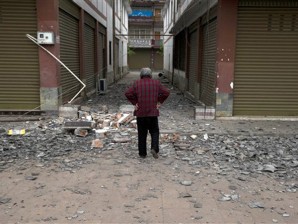China rushes relief after Sichuan quake kills 179

A woman walks past tiles shaken from roof tops by an earthquake near Shangli town in southwestern China’s Sichuan province, Sunday, April 21, 2013. Residents awoke Sunday after spending the night outdoors or in their cars in the town near the epicenter of a powerful earthquake that struck the steep hills of China’s southwestern Sichuan province, leaving at least 160 people dead and more than 6,700 injured. AP/Ng Han Guan
YA’AN, China — Rescuers and relief teams struggled to rush supplies into the rural hills of China’s Sichuan province Sunday after an earthquake left at least 179 people dead and more than 6,700 injured and caused frightened survivors spent a night in cars, tents and makeshift shelters.
The earthquake Saturday morning triggered landslides that cut off roads and disrupted phone and power connections in mountainous Lushan county, further south on the same fault line where a devastating quake wreaked widespread damage across the region five years ago.
Hardest hit Saturday were villages further up the valleys, where farmers grow rice, vegetables and corn on terraced plots. Rescuers hiked into neighboring Baoxing county after its roads were cut off, reaching it overnight, state media reported. In Longmen village, authorities said nearly all the buildings had been destroyed in a frightening minute-long shaking by the quake.
In the fog-covered town of Shuangli, corn farmer Zheng Xianlan said Sunday that the quake damaged her house, in a setback for a family that does not have much money. She rushed from the fields back to her home when the quake struck, and cried when she saw that the roof collapsed. She then spent the night outdoors on a worn sofa using a plastic raincoat for a cover to watch over it.
“We don’t earn much money. We don’t know what we will do now,” said 58-year-old Zheng, her eyes welling with tears. “The government only brought one tent for the whole village so far, but that’s not enough for us.”
Article continues after this advertisementAlong the main roads, ambulances, fire engines and military trucks piled high with supplies waited in long lines, some turning back to try other routes when roads were impassable.
Article continues after this advertisementRescuers were forced to dynamite boulders that had fallen across roads, and rains Saturday night slowed rescue work, state media reported.
Chinese Premier Li Keqiang arrived Saturday afternoon by helicopter in Ya’an to direct rescue efforts, the government’s official Xinhua News Agency reported.
“The current priority is to save lives,” Li said, after visiting hospitals, tents and climbing on a pile of rubble to view the devastation, according to Xinhua.
Xinhua, citing the China Earthquake Administration, said at least 179 people had died, and more than 6,700 were injured.
The quake — measured by the earthquake administration at magnitude-7.0 and by the U.S. Geological Survey at 6.6 — struck shortly after 8 a.m. Saturday, when many people were at home, sleeping or having breakfast.
Tens of thousands of people moved into tents or cars, unable to return home or too afraid to go back as aftershocks continued to jolt the region. In Ya’an, a city that administers Lushan, where aftershocks rattled buildings nearly a day after the quake, residents sat in groups outside convenience stores watching the news on television sets early Sunday. Fourteen-year-old Wang Xing sat with her family on chairs by the roadside in the cool night air, a large blanket on her lap.
Wang and her relatives decided to spend the night in their cars. “We don’t feel safe sleeping at home tonight,” said Wang, a student. She said the quake left tears on the walls of her family’s house. “It was very scary when it happened. I ran out of my bed and out of the house. I didn’t even have my shoes on.”
As in most natural disasters, the government mobilized thousands of soldiers and others, sending excavators and other heavy machinery as well as tents, blankets and other emergency supplies. Two soldiers died after their vehicle slide off a road and rolled down a cliff, state media reported.
The Chinese Red Cross said it had deployed relief teams with supplies of food, water, medicine and rescue equipment to the disaster areas.
Lushan, where the quake struck, lies where the fertile Sichuan plain meets foothills that eventually rise to the Tibetan plateau and sits atop the Longmenshan fault. It was along the same fault line that a devastating magnitude-7.9 quake struck on May 12, 2008, leaving more than 90,000 people dead or missing and presumed dead in one of the worst natural disasters to strike China in recent decades.
“It was just like May 12,” Liu Xi, a writer in Ya’an city, said via a private message on his account on the Twitter-like Weibo service. “All the home decorations fell at once, and the old house cracked.”
The official Xinhua News Agency said the well-known Bifengxia panda preserve, which is near Lushan, was not affected by the quake. Dozens of pandas were moved to Bifengxia from another preserve, Wolong, after its habitat was wrecked by the 2008 quake.